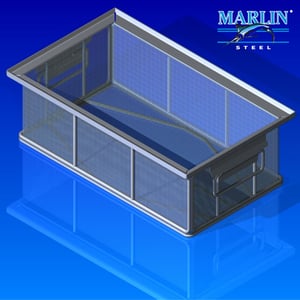 For many of the custom wire baskets that Marlin designs for manufacturing customers, a specialized corrosion-resistant stainless steel alloy is the default. Stainless steels such as grade 304 or grade 316 are more resistant to corrosion from exposure to acidic compounds, chlorides, and other chemical solutions than plain steel—meaning they’ll last longer in many manufacturing applications and environments.
For many of the custom wire baskets that Marlin designs for manufacturing customers, a specialized corrosion-resistant stainless steel alloy is the default. Stainless steels such as grade 304 or grade 316 are more resistant to corrosion from exposure to acidic compounds, chlorides, and other chemical solutions than plain steel—meaning they’ll last longer in many manufacturing applications and environments.
However, there are times where “plain” 1010 grade low carbon plain steel can work just as well for a given application as the more expensive grades of stainless steel. When would 1010 low carbon steel work well for your custom baskets?
1: Materials Handling in Non-Corrosive Environments
One of the most common uses of grade 1010 low carbon steel is in basic materials handling tasks, such as moving heavy loads of raw materials or plain steel parts from one station to the next on your factory floor.
Plain steel is well-suited to this task, as it has a high tensile strength compared to polymers that allow even relatively thin wires to support significant loads.
2: When Making Custom Shapes to “Grip” Parts
Grade 1010 low carbon steel is very easy to shape compared to other steels—which makes creating specific shapes easier.
Low carbon steel is also easily welded. This means that when the time comes to assemble a complex wire form, it’s relatively simple to join two lengths of low carbon grade 1010 steel without risk of cracking.
By taking advantage of the formability and weldability of low carbon plain steel, degreed engineers can create more complex wire forms.
This is invaluable for creating custom grips to securely hold specific parts in place so they don’t roll or bounce around in custom wire baskets. Easy formability and weldability makes it easier to achieve consistent results in a design from one basket to the next, simplifying production of custom baskets.
3: When You’re Going to Be Using a Specialized Coating
Sometimes, even the most corrosion-resistant grades of stainless steel might not be enough to withstand prolonged exposure to your manufacturing process or environment. In such cases, chemically resistant coatings are used to protect the steel from direct exposure.
While a sufficiently caustic environment might still wear out the coating, it’s often easier (and less costly) to remove and reapply a coating than it is to replace the entire basket.
When the steel is going to be completely covered by a protective coating of other material, it may be worthwhile to simply use plain steel instead of a costlier stainless steel.
However, it’s important to keep in mind the incidental exposure that may occur in places where there may be gaps in the coating, such as over hinges or latches on lids for some custom basket designs.
4: In Processes Where the Basket Will Frequently Contact Plain Steel or Iron
One of the major caveats of using stainless steel custom baskets is that such baskets should be prevented from coming into direct contact with plain steel or iron whenever possible. This is because the iron molecules in the plain steel or iron can be transferred to the stainless steel’s surface. Once embedded in the stainless, the iron will compromise the protective oxide layer that keeps the “stainless” steel from becoming corroded.
In applications where direct contact with plain steel or iron objects is inevitable, it may be better to use plain steel or apply a specialized coating to the basket.
Overall, plain 1010 low carbon steel is a perfectly fine budget-conscious choice for many basic materials handling applications. However, grade 304 and 316 still remain the better choice for the majority of parts finishing processes that involve any kind of chemical solution—including plain water.
Learn more about the different options for your custom wire baskets by contacting Marlin Steel as soon as possible!
Related Articles:
Stainless Steel Vs Plain Steel for Parts Cleaning Baskets



.gif)


